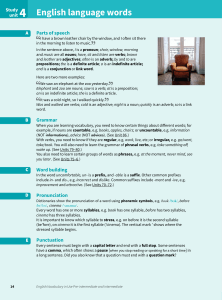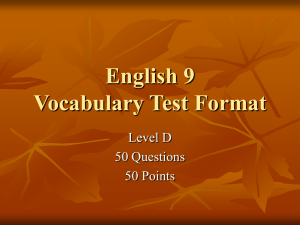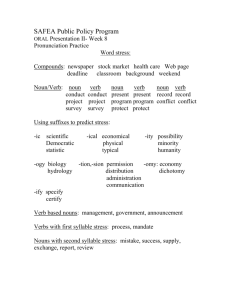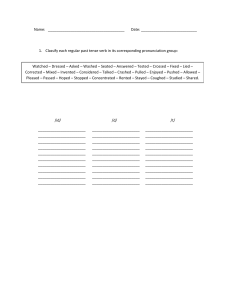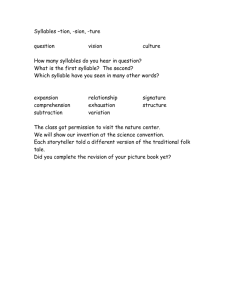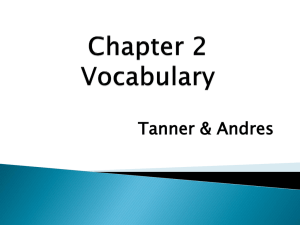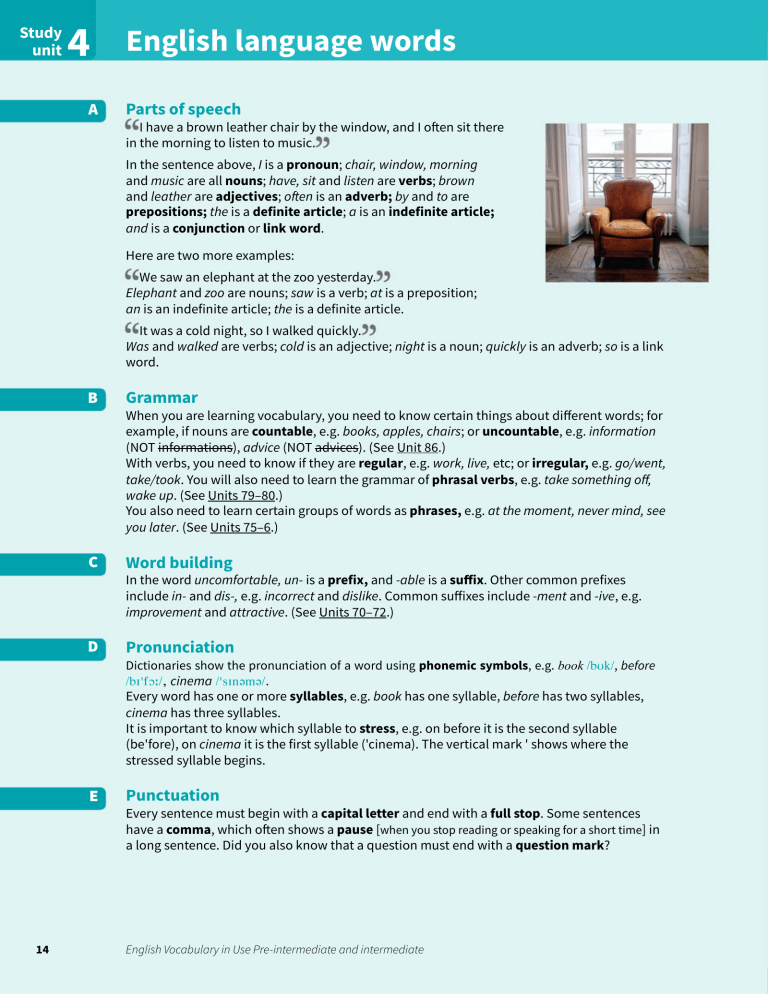
Study
unit
4
A
English language words
Parts of speech
I have a brown leather chair by the window, and I often sit there
in the morning to listen to music.
In the sentence above, I is a pronoun; chair, window, morning
and music are all nouns; have, sit and listen are verbs; brown
and leather are adjectives; often is an adverb; by and to are
prepositions; the is a definite article; a is an indefinite article;
and is a conjunction or link word.
Here are two more examples:
We saw an elephant at the zoo yesterday.
Elephant and zoo are nouns; saw is a verb; at is a preposition;
an is an indefinite article; the is a definite article.
It was a cold night, so I walked quickly.
Was and walked are verbs; cold is an adjective; night is a noun; quickly is an adverb; so is a link
word.
B
Grammar
C
Word building
D
Pronunciation
When you are learning vocabulary, you need to know certain things about different words; for
example, if nouns are countable, e.g. books, apples, chairs; or uncountable, e.g. information
(NOT informations), advice (NOT advices). (See Unit 86.)
With verbs, you need to know if they are regular, e.g. work, live, etc; or irregular, e.g. go/went,
take/took. You will also need to learn the grammar of phrasal verbs, e.g. take something off,
wake up. (See Units 79–80.)
You also need to learn certain groups of words as phrases, e.g. at the moment, never mind, see
you later. (See Units 75–6.)
In the word uncomfortable, un- is a prefix, and -able is a suffix. Other common prefixes
include in- and dis-, e.g. incorrect and dislike. Common suffixes include -ment and -ive, e.g.
improvement and attractive. (See Units 70–72.)
Dictionaries show the pronunciation of a word using phonemic symbols, e.g. book /bʊk/, before
/bɪˈfɔː/, cinema /ˈsɪnəmə/.
Every word has one or more syllables, e.g. book has one syllable, before has two syllables,
cinema has three syllables.
It is important to know which syllable to stress, e.g. on before it is the second syllable
(be'fore), on cinema it is the first syllable ('cinema). The vertical mark ' shows where the
stressed syllable begins.
E
14
Punctuation
Every sentence must begin with a capital letter and end with a full stop. Some sentences
have a comma, which often shows a pause [when you stop reading or speaking for a short time] in
a long sentence. Did you also know that a question must end with a question mark?
English Vocabulary in Use Pre-intermediate and intermediate
4
Exercises
4.1
Study
unit
Put the words into the correct columns.
noun comma phonemic symbol
adverb stress
question mark
syllable preposition
full stop adjective
parts of speech
punctuation
pronunciation
noun
4.2
There is one word missing in each line of the text. Where does the missing word go?
What could it be? What part of speech is it?
Last year I went to for my holiday. I spent the first
week Seville staying with a couple of friends, and
then I a train to Barcelona, where I spent another
ten days. It is beautiful city and I had a marvellous
time. I stayed in a very hotel right in the centre, but
I didn’t mind spending a lot money because it was a
wonderful and it was very convenient. My brother was
the person who recommended it; he goes Spain a lot
and he stays anywhere else. I may go back next year
if have enough time.
4.3
What type of verb is break? an irregular verb
What does a sentence begin with?
What do you put at the end of every sentence?
What’s missing here.
What shows you there is a pause in the middle of a long sentence?
What type of noun is butter?
What type of verbs are pick somebody up and grow up?
What are full stop and comma examples of?
How do dictionaries show the pronunciation of a word?
Is the ‘a’ in phrase pronounced the same as can, can’t or late?
Mark the stress on each word. How many syllables are there?
' English 2
decide
4.5
Spain (noun)
Answer the questions.
1
2
3
4
5
6
7
8
9
10
4.4
1
2
3
4
5
6
7
8
9
10
informal
adjective
opposite
education
syllable
pronunciation
Look at these words and answer the questions.
cheap
1
2
3
4
5
dangerous
kind
lucky
adjectives
What part of speech are these words?
Can you change the first two words into adverbs?
Is the pronunciation of kind like wind (noun) or find (verb)?
What prefix do you need to form the opposite of the last two words?
What suffix makes a noun from kind?
English Vocabulary in Use Pre-intermediate and intermediate
15
